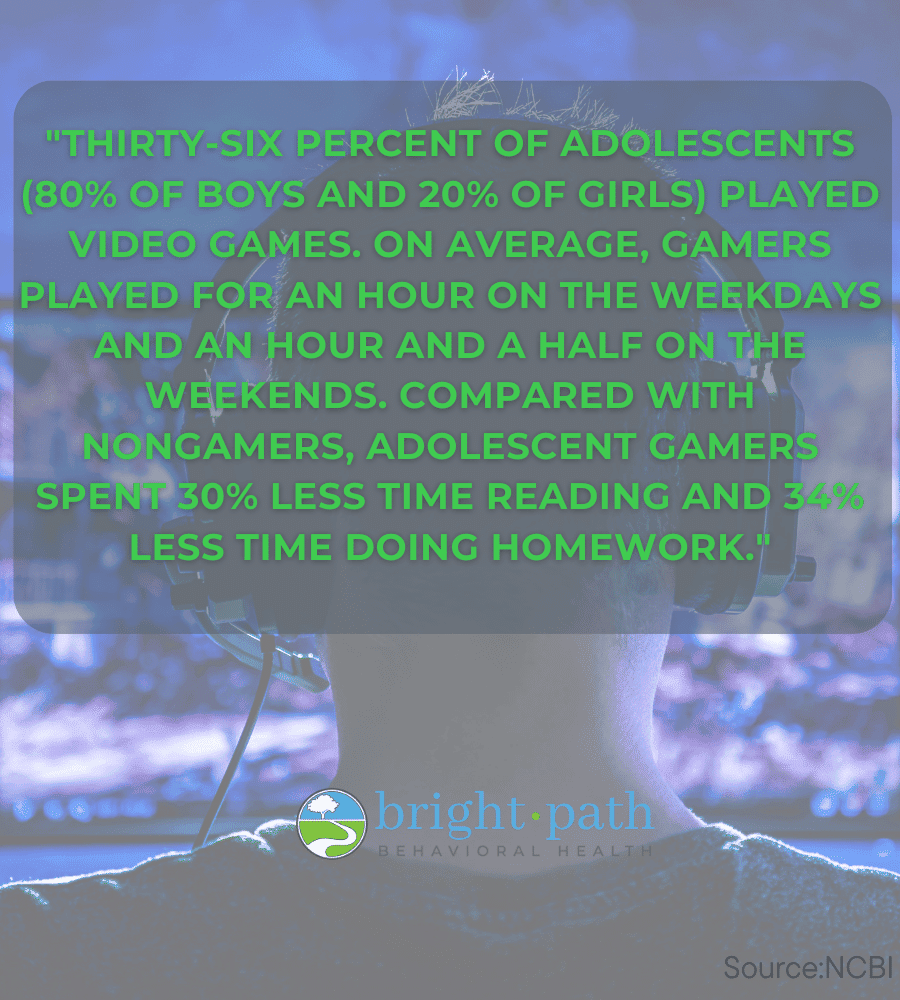In the dynamic landscape of today’s entertainment, video games have etched an irrefutable mark on the hearts and minds of teenagers. With a profound influence that transcends mere pastime, video gaming has woven itself into the fabric of modern youth culture, sparking both fascination and concern among parents, educators, and mental health professionals. This article aims to examine the multifaceted effects of video games on teen mental health, delving into both the enriching benefits and potential pitfalls. By navigating through scientific research, expert opinions, and real-life examples, we will uncover the complexities of video gaming’s impact on the psyche of adolescents and provide insights for a balanced and mindful approach to this pervasive phenomenon.
What Are The Negative Effects of Video Games on Teen Mental Health
1. Addiction and Compulsive Behavior
Excessive gaming can lead to addiction and obsessive behaviors, impacting academics, social life, and overall well-being. A study conducted by the National Center for Biotechnology Information found that excessive video game playing may be linked to negative mental health outcomes in adolescents. The research revealed a significant relationship between the amount of time spent playing video games and increased levels of stress. According to the study, “The connection between gaming hours and stress highlights the need for parents and guardians to monitor the gaming habits of teens and implement healthy boundaries.”

The popularity of video games among adolescents is undeniable, with a study by NCBI revealing that thirty-six percent of adolescents (80% of boys and 20% of girls) played video games. On average, gamers played for an hour on the weekdays and an hour and a half on the weekends.
NCBI
2. Impact on Academic Performance
Compared with nongamers, adolescent gamers spent 30% less time reading and 34% less time doing homework. This shift in priorities may lead to declining academic performance and decreased engagement in educational pursuits.
3. Social Implications
Among gamers (both genders), time spent playing video games without parents or friends was negatively related to time spent with parents and friends in other activities. This isolation can lead to feelings of loneliness and detachment from family and peers.
By understanding and acknowledging these potential drawbacks, parents, educators, and mental health professionals can work together to establish healthy gaming habits and seek teen mental health treatment centers when necessary.
4. Exposure to Violence and Aggressive Behavior
Certain games containing violent content might instigate aggressive behavior in impressionable teens, leading to a desensitization to real-world violence.
5. Impact on Physical Health
Long hours of gaming without breaks can cause physical health issues like eye strain, obesity, and poor posture, which indirectly affect mental well-being.
How Can You Balance Healthy Gaming Vs Unhealthy Gaming and Addiction?
1. Setting Time Limits
Encouraging reasonable time limits ensures that gaming remains a hobby rather than a consuming obsession.
2. Parental Guidance and Open Communication
Open dialogue between parents and children about gaming content, time spent, and the importance of other responsibilities can foster a healthy gaming environment.
3. Encouraging Varied Interests
Promoting hobbies and activities outside of gaming helps in developing a well-rounded personality, preventing over-reliance on virtual worlds.
What Are The Positive Impacts of Video Games on Teen Mental Health?
While there are undeniable risks, video games also have potential benefits when played in moderation. They can improve cognitive function, hand-eye coordination, problem-solving abilities, and even social skills through collaborative gameplay. Below are some of the positive benefits of video games:
Cognitive Development
Video games often require strategic thinking, problem-solving, and hand-eye coordination. Through engaging in these challenges, teenagers can enhance their cognitive skills, learning to think critically and adapt to different situations.
Social Connections
Online gaming platforms allow teens to connect with friends and even make new ones globally. This can foster social interaction and teamwork, providing a sense of community and belonging.
Emotional Resilience
Facing challenges and overcoming obstacles in games can boost teens’ self-confidence and resilience, teaching them the importance of persistence and hard work.
How to Encourage Healthy Gaming Habits?
- Set Boundaries: Limit the amount of time your teen can spend on gaming, and encourage other hobbies and outdoor activities.
- Monitor Content: Choose age-appropriate games and be aware of the content that your teen is consuming.
- Encourage Social Interaction: Encourage playing games that require cooperation and teamwork rather than isolation.
When Professional Help is Needed
If your teen’s gaming habit is affecting their daily life, mental well-being, and academic performance, it might be time to seek professional assistance. Many programs, such as teen mental health treatment centers, offer specialized support tailored to adolescents. Early intervention can prevent long-term negative effects and guide them back to a balanced and healthy life.
Final Thoughts On Teen Mental Health And Gaming
The complex relationship between video gaming and teen mental health is one that demands careful consideration and balanced understanding. While video games can provide entertainment, social connection, and even educational value, the statistics and studies clearly highlight potential risks when played excessively.
The association between increased gaming hours and stress levels, the negative impact on academic performance, and the potential for social isolation are alarming findings that cannot be overlooked. It’s crucial for parents, educators, and mental health professionals to monitor gaming habits and recognize signs of unhealthy gaming behavior.
Resources such as Partial Hospitalization teen mental health treatment can provide support and guidance for those who might be struggling with the negative effects of gaming. Collaboration between various parental stakeholders can foster a balanced approach, ensuring that gaming remains a positive aspect of adolescent life without compromising mental well-being.
In conclusion, video gaming in itself is not the villain. Like any form of media or entertainment, it requires responsible usage and an understanding of its potential impact on mental health. As a society, our collective effort to educate, support, and guide our youth in responsible gaming can lead to a healthier and more balanced approach to this popular pastime. The goal is not to ban or demonize gaming but to understand its place within a holistic and healthy lifestyle. If you child is struggling with behavioral issues as a result of gaming, contact us, we’re here to help.

Share This Post




